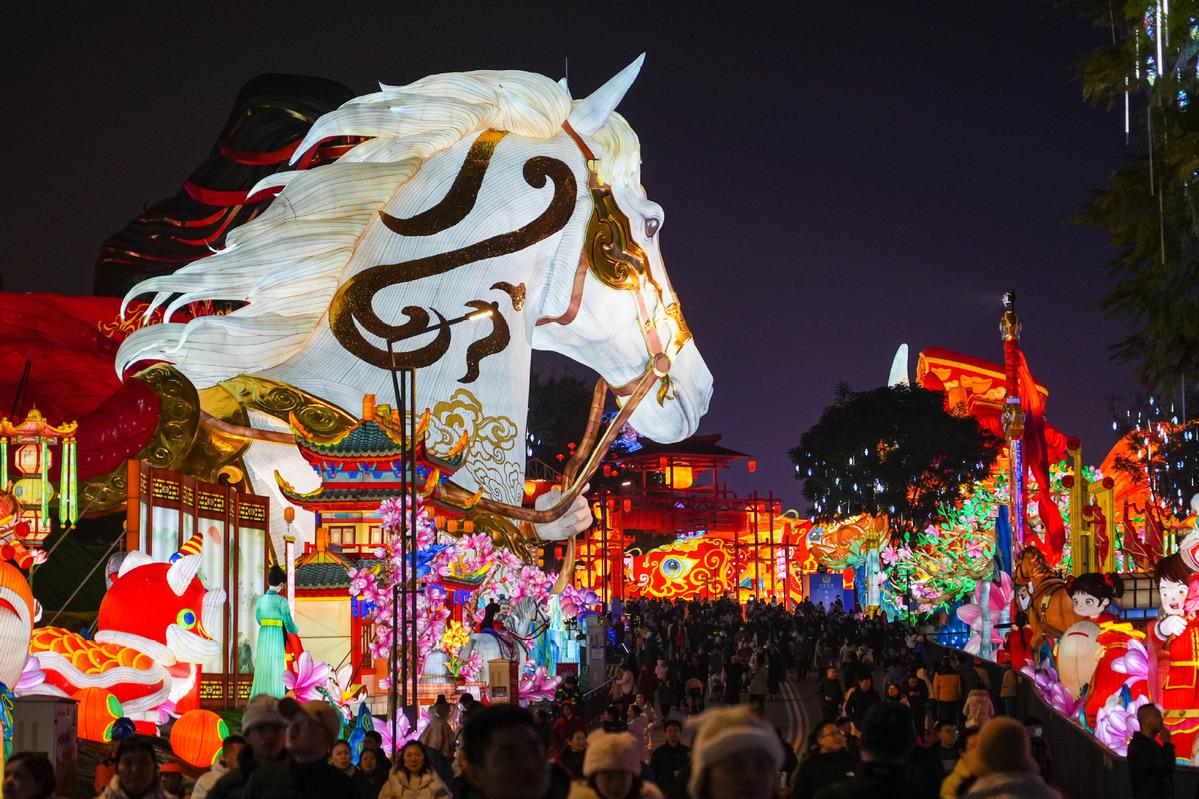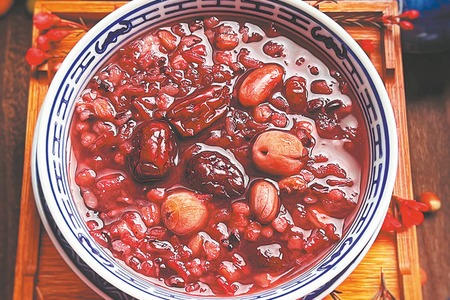Makeup brushes sitting pretty in Hebei
One county near Beijing, Tianjin makes half of nation's output

Chinese-made makeup brushes have seen robust sales in the country since last year, even during the COVID-19 pandemic, which left many consumers stuck at home, creating more time to shop online.
There were more than 21,000 manufacturers of makeup brushes in China by the end of last year. Over 6,400 were newly set up in 2020, according to a report by the Xinhua Daily Telegraph, a Chinese language newspaper in Beijing.
When thinking of quality makeup brushes, famous brands from developed countries such as Japan's Chikuhodo often come to mind.
However, Qingxian county in Cangzhou, Hebei province, has emerged as one of the country's largest makeup brush manufacturing areas.
"About half of the brushes made domestically are from the county and the quality of our brushes can compete with big name international brands," said Kang Shaoxing, president of the Qingxian Makeup Brush Industry Association.
His confidence comes from the fact that the county has rich experience in manufacturing brushes for luxury international brands since the 1990s, when the first brush maker in Qingxian was established by a businessman from South Korea.
About 170 kilometers southeast of Beijing and 80 km southwest of Tianjin, the county boasts convenient transportation to both cities and the Bohai Sea.
In addition, low labor costs and favorable local government policies have attracted investment from South Korea. About 30 manufacturers of makeup brushes from South Korea have set up shop in Qingxian.
In the 1990s, Qingxian became well-known as a center for woolen sweaters, complete with wool processing units and a skilled workforce whose wool techniques were adaptable and relevant to brush-making, a craft that soon acquired dimensions of an industry.
Two decades of development, and proximity to ports like Tianjin and to South Korea, helped it to boom, not necessarily with foreign investors, but with emerging domestic entrepreneurs and brands.
With a population of more than 441,000 people, Qingxian now boasts 141 makeup brush manufacturers, including 15 foreign-invested ones, and more than 1,000 factories making related and supporting materials. The industry employs a total of 16,000 local employees, according to a recent white paper on the county's makeup brush industry.
Last year, revenue of the makeup brush industry in Qingxian topped 1.5 billion yuan ($232 million), and about 15 percent of which are from exports. Currently, the county has registered almost 500 local brands, which operate a total of 2,000 e-commerce stores at different online platforms, the white paper said.
Shao Junhua, a local whose career has been involved with brushes from the very beginning, tells a story typical of the development of the county's brush industry.
The 47-year-old woman began working at a South Korea-invested factory in the 1990s. In her five years at the factory, she held different posts and became skilled at all procedures for producing a makeup brush from scratch, including tidying up bristles and molding brush tips into various shapes.
"I wanted to open a factory myself so that I can chase my own dreams," she said. Fortunately, her boss in the South Korean company-Cangzhou Sanxing Brush Making Co based in neighboring Cangxian county-encouraged her to do so.
The South Korean companies had labor costs much higher than local companies, Shao said. She said sometimes international orders surpassed foreign companies' production capacity limits, thus forcing them to parcel out work to neighboring plants.
Together with her husband-who also used to work at the same company as an interpreter and quality inspection staffer-they set up a factory, but only for making bristles at first.
The bristles, made in accordance with standards of overseas orders, were supplied to her ex-employer, who was very satisfied with the bristles' quality and encouraged Shao to produce more complete sets of makeup brushes.
"My ex-boss was right, if I didn't do it, I would lag behind, because in a few years, more factories will be opened by locals that attained knowhow in brush-making," Shao said.
In 2007, Shao's factory transformed and started to make whole sets of makeup brushes, but still for international brands processed via her former employer.
"Several years later, I realized that even if I made the best products, they were only for others," she said. With more ideas in mind, Shao registered a brand for her own company, under which she could utilize her own thoughts about brushes.
Although Shao herself was not a big user of makeup, she started to try them one by one, from foundation brushes to eye shadow brushes and lip liner brushes.
"I would figure out many details like what shape of bristles is best for a blush brush and what kind of handle is easy to hold for a fluffy blending brush," she said.
Shao was further motivated because she could innovate with the brushes and nurture a brand of her own. She gave her brand the name of "Fix+", meaning any beauty lover could fix unsatisfactory blemishes and find beauty with the brushes.
To date, Shao's company-Qingxian Donghua Cosmetic Applicators Co-can produce more than a million makeup brushes and sell about 40 million yuan annually via two stores on Alibaba's Taobao and Tmall.
Shao said her company only makes medium and high-end products. "It's a general trend that almost all brush makers in Qingxian target brushes of higher quality for high-end consumers."
By the end of the year, she plans to manufacture makeup brushes of the highest quality possible, with bristles made of natural materials like goat hair, and handles hewed from fancy wood and even delicate carvings.
"I want my customers to have the best experience using my brushes," she said, adding that the brushes could be a craft for people who like applying makeup.
Shao's experience is typical for many locals in Qingxian who used to be skilled workers at foreign-invested companies. They created their own brands in the 2010s, and aimed to promote their brands further with higher quality.
Kang Shaoxing, president of the Qingxian Makeup Brush Industry Association, is one of the earliest trendsetters. He registered a brand named Energy in 2011. At the time, other local brands, including Shoushoulang, Qinzhi and Huayang, were also registered and have since become very popular in the domestic makeup brush field.
When the industry's foundation was established by these elder skilled workers, some new entrepreneurs started to see great potential in the sector and joined in.
Zhang Mengwei is a 33-year-old general manager of a relatively new company-Cangzhou Pinzheng Cosmetic Applicators Co-which he established in 2019 along with three other young partners.
"Our county has built a solid foundation for developing the industry, equipped with whole-chain companies, from raw materials and brushes to promoting and selling finished products," said Zhang, who used to work at a car wash.
As a young team, they did not set up a factory to manufacture the brushes at first, but collected good products from other mature factories and sold them on different e-commerce platforms, including Tmall, Pinduoduo, Douyin and Kuaishou-all popular with Chinese consumers.
For their first year of operations in 2016, they achieved sales revenue of more than 3.5 million yuan. "It was a big number for us at the time," Zhang said, adding he got greatly motivated by this early performance.
He quickly realized that product quality was the top issue for successful participants in the sector.
"Products collected from different factories had some differences, because most of the manufacturing procedures were done manually."
To make products more uniformly in line with his standards, Zhang registered a brand in 2018 and the next year established his own factory.
"I have higher standards for the shapes of brush tips, because even minor changes may make users more comfortable," Zhang said.
With enhanced quality and accumulated customers online, Zhang's brand surpassed other local brands with longer histories and has become the top player with the highest single-day sales revenue.
In 2019, sales of his Huayang products reached more than 10 million yuan. Last year, sales reached 40 million yuan. He expects revenue to top 80 million yuan this year.
As a young entrepreneur, Zhang was included in the county's Makeup Brush Industry Association and is responsible for sharing his experiences with younger entrepreneurs interested in doing a similar business online.
"The local government is enhancing its support for the industry, because it has seen a great potential to develop the industry, especially after the pandemic, when makeup brushes have seen booming sales," the association's president Kang said.



Today's Top News
- Spring Festival celebrations to amplify consumption
- Deeper Sino-Serbian ties eyed
- Greenland marks Europe's transition as it draws redline
- PLA Daily: China resolute in winning anti-graft war
- Davos meet lays bare tensions and challenges
- Growth gaining traction amid upbeat outlook






























